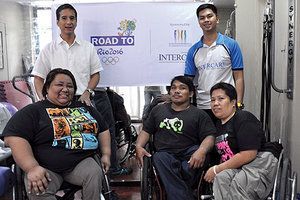Spearheaded by burgeoning scientific and clinical research literature, psychedelics have reached a level of media coverage and popular interest that has not been seen for over half a century. By “psychedelics,” we are referring to the unique class of substances that includes psilocybin (the active compound found in so-called “magic mushrooms”), LSD, dimethyltryptamine (DMT), ayahuasca, 5-MeO-DMT, and mescaline – each of which occurs in the natural world (except for LSD, which is a semi-synthetic compound).
Beating the Odds: Interview With Para-Powerlifter Adeline Dumapong-Ancheta
Editor's Note: The following article is reprinted with permission from the International Federation of Sports Chiropractic. It appeared originally in the March 31, 2016 issue of FICS News and is edited minimally from the original version to meet our editorial / style guide requirements.
Since October 2015, the FICS Foundation, the charitable organization affiliated with the International Federation of Sports Chiropractic (FICS), has been supporting disabled athletes internationally. This includes three para powerlifters in the Philippines hoping to qualify for the August 2016 Paralympic Games, to be held in Rio de Janeiro, Brazil.
The FICS Foundation, in cooperation with the Philippines National Paralympic Committee (PHILSPADA), is providing them with financial support for training and competition, and chiropractic care. This is an interview with one of these three elite powerlifters, Adeline Dumapong-Ancheta of Manila, who is receiving chiropractic care from Dr. Martin Camara, a member of the FICS Foundation Board.
First, Adeline, congratulations on your recent gold medal at the 8th ASEAN Para Games in Singapore last December. You have won more than one gold medal at these Games? Thank you. Yes, that was my sixth gold in women's para powerlifting in my weight class at the ASEAN Games, which are held annually, my first being in Vietnam in 2003.
Before discussing powerlifting and your athletic career, tell us about your background and the nature of your disabilities. I was born to a poor family with six children in Kiangan, Ifugao, a mountainous part of the northern Philippines, in 1973. At the age of 3, I had polio, lost the use of both legs, and became confined to a wheelchair. At 6, my parents, believing that education would be the key for me to make something of my life in spite of my disability, made the painful decision to send me to an institution and school for children with disabilities in the capital city, Manila.

After 10 years of primary and secondary education in this school for children with disabilities only, I went to St. Paul University in Quezon City, where I graduated with a Bachelor of Science.
I then worked in both the corporate and nonprofit sectors in administration and marketing. I have just completed a four-year contract as executive director of the Freedom Technology Wheelchair Foundation, a nonprofit wheelchair factory in Mindanao.
Currently, I am a full-time mother to my 13-year old daughter, but combined with my athletic career, freelance work for local NGOs and other voluntary work. I am the athletes' representative at PHILSPADA, the governing body for Paralympians in the Philippines, and on the Women in Sport Committee of the Asian Paralympic Committee.
What is powerlifting? Powerlifting is a strength sport similar to weightlifting, but with the three disciplines of benchpress, deadlift and squat. In para powerlifting, there is only one discipline, the bench press, with competitors in 10 different categories based on body weight. This has been a Paralympic sport since 1984. Competitors lower the bar to the chest and then press it upwards to arms' length with locked elbows. Athletes are given three attempts and the winner is the one who lifts the greatest weight.
How long have you been in the sport? Eighteen years. During my 10 years at school in Manila, I was introduced to sports such as wheelchair race, wheelchair basketball and athletics. I discovered powerlifting in 1997, when it was a relatively new sport and mostly for men. When I tried the bench press, I felt challenged and loved it. I began to compete locally, and PHILSPADA then sent me to Thailand and the USA to qualify for the Sydney Paralympic Games in 2000. In Sydney, I won the bronze medal in my weight division, the first-ever Paralympic medal for the Philippines, and the most prestigious medal I have won.
I competed at the Athens (2004), Beijing (2008) and London (2012) Paralympics, but did not medal. I am currently free of injuries and training hard for selection for the Rio Paralympics.
What injuries have you had? My main concern has been carpal tunnel syndrome in both wrists due to overuse of my hands, aggravated by my powerlifting activities. Surgical release has been recommended, but I have refused that treatment. Aside from that, I have had the usual pain in the shoulders, arms, chest, and mid- and lower-back that comes with living in a wheelchair, also aggravated by my sport.
Tell us about your chiropractic care. I had heard of chiropractic treatment in the past, but I was skeptical about it from my only experience, which was from chiropractic volunteers who came to treat us once a year during the last two years. To be candid, I did not feel any different.
Then last October, my athlete friends and I met Dr. Martin [Camara] at the office of PHILSPADA and the result has been very impressive. I felt that he performed "magic" when he made a simple adjustment to my neck area on his first treatment. The result was immediate and I felt the difference in my next training day. My left arm, which has always been my problem, had clearly improved in strength. I was so impressed.
I was afraid, however, that this wouldn't last – so much so that I asked Dr. Martin if there was an expiration date for this magic he had performed. There hasn't been. In the months since, I have remained under his care to fix some recurring problems, and to keep free of injury and pain during my full training schedule.
Now I am a believer that with this combination of proper training and chiropractic treatment, I can still improve in my sport. I lifted 110 kg for my bronze medal at the Sydney Paralympics in 2000, improved to a personal best of 128 kg in 2012, but injuries then limited my training and brought me back to around 110 kg. Since my gold medal at the ASEAN Para Games, I achieved a No. 4 ranking at the World Cup Powerlifting Qualifier in Malaysia on Feb. 29 with a lift of 117 kg. I hope this will lead to selection for the Rio Paralympics and a strong result there. [Good news: As we went to press with this reprint, the FICS informed us that Adeline has been selected to go to Rio later this year.]
How long will you continue to powerlift? Sport is very important to me because it has been the one constant thing in my life since I was a child. There was a period in my life when it was the only thing that kept me going, giving me the will to just keep moving forward. I only have a few more years left for competitive powerlifting, but will then find another sporting activity.
I plan to stay engaged in para powerlifting as a coach or a technical official, and to encourage other athletes with disabilities. In all the years of being in disabled sport, I know very well the challenges for persons with disabilities, particularly in a developing country like the Philippines. However, we can still produce world-class athletes in spite of everything.
Describe some of the voluntary work you are doing already. I try to influence and convince other persons with disabilities, especially children and women, to engage in sport or at least have an active lifestyle. I do a radio program called "The Paralympic Hour" on Wednesdays, 11:00 to 12 noon at Sports Radio DZSR 918, and have organized two groups here in Luzon for women with disabilities.
I [also] assist the performing group "Rondalla On Wheels," which [helps] keep children with disabilities active in music, rather than in sport. My involvement includes teaching basic music theory, teaching how to play the banduria (a 14-stringed Filipino instrument), and counseling.
Finally, I receive and accept many invitations to speak in schools and to other organizations about my life and athletic career in disabled sport. My parents' decisions gave me a strong education and much new opportunity in life. Because of that and my experiences, I want to create opportunities for others, particularly through generating support for sport for persons with disabilities.
A Note From Dr. Martin Camara
On behalf of the FICS Foundation, I met with Adeline and other athletes at the PHILSPADA offices in Manila on Oct. 22, 2015. She was curious about what chiropractic had to offer for her recurrent problems encountered during training (bilateral wrist, elbow and shoulder pain, and persistent low-back pain), asked many good questions regarding how chiropractic could help her medical conditions – and became increasingly interested when hearing about how chiropractic might help to optimize her lifting.
Seeing how interested she was, I decided to assess her first, and proceeded to muscle test her problematic left shoulder and to identify cervical spinal levels that could facilitate shoulder strength. A Gonstead adjustment (C5 left) led to dramatic improvements in her shoulder flexion and abduction strength.
At this point, the team was convinced and we proceeded to schedule the athletes in our clinic to begin their chiropractic care, working toward qualification for Rio Paralympic Games. All three athletes have responded well, and now continue on maintenance care to prevent injury and improve performance. At present, Adeline has none of her previous recurrent problems and is no longer considering any type of carpel tunnel surgery.
Editor's Note: To learn more about the FICS Foundation, its fundraising activities and/or to make a donation, visit www.fics-sport.org/foundation.



